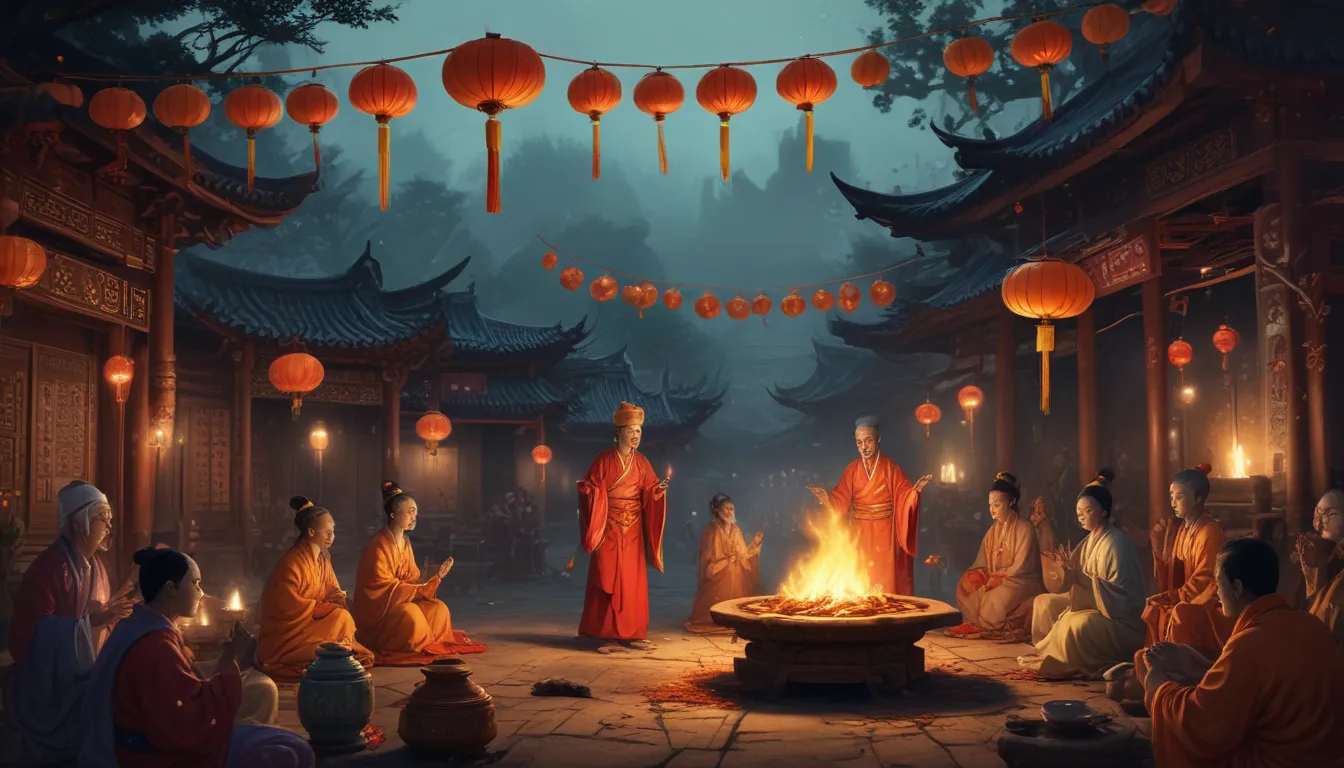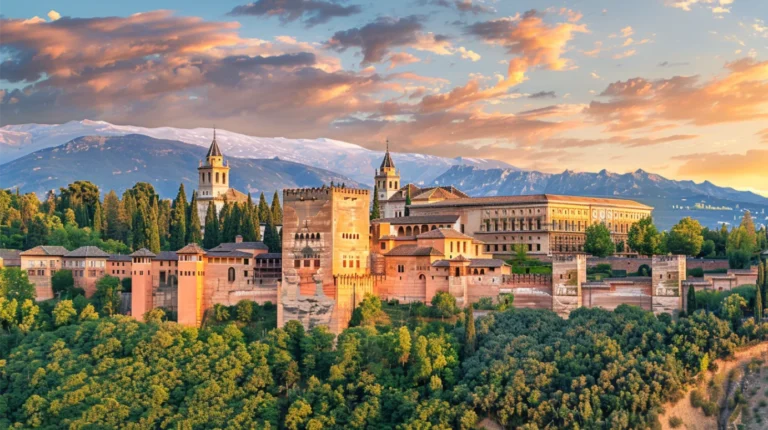The images in our articles may not match the content exactly. They are used to grab your attention, not to show the exact details in the text. The images complement the text but do not replace it.
The Hungry Ghost Festival, known as Zhong Yuan Jie, is a significant event celebrated by Taoists and Chinese Buddhists in the seventh month of the lunar calendar. This tradition, deeply rooted in ancient beliefs, revolves around the concept of hungry ghosts wandering the earth as the gates of hell open. While some may compare it to Halloween, the Hungry Ghost Festival holds a profound spiritual significance for those who observe it.
Exploring the Origins of the Hungry Ghost Festival
The name “Hungry Ghost Festival” originates from the belief that the ghosts that roam during this month are in dire need of appeasement. The term “ghost” comes from the Old English word “gast,” meaning spirit or soul, while “hunger” traces back to the proto-Germanic word “hungraz,” signifying scarcity of food. This linguistic fusion accurately captures the essence of the festival.
This ancient tradition is celebrated both as a Taoist holiday and a Buddhist Chinese festival. Taoists focus on placating the spirits fleeing through the ghost gate to restore peace and harmony, while Chinese Buddhists emphasize honoring their ancestors through offerings and prayers. While the exact origins of the Hungry Ghost Festival remain elusive, its roots can be traced back to Buddhism, with records of celebrations dating back to the early 1800s in Singapore.
The Taoist Celebration
During the Hungry Ghost Month, Taoists commemorate the birthday of Di Guan Da Di, a revered deity believed to forgive sins. On the 15th day of the seventh month, according to legend, Di Guan Da Di descends to earth to assess humanity’s deeds. Taoist priests play a crucial role in assisting the wandering spirits, offering rituals to ease their restlessness and providing food offerings to appease them. Devotees visit temples to confess sins and seek forgiveness, fostering a sense of spiritual connection with the departed souls.
The Buddhist Celebration
For Buddhists, the Hungry Ghost Festival is also known as Yu Lan Pen or the Buddhist Ullambana Festival. This festival focuses on the story of Mu Lian and his mother, highlighting the importance of offering support to those in purgatory. The legend recounts Mu Lian’s journey to rescue his mother, who had become a hungry ghost due to her past actions. Through Buddha’s teachings, Mu Lian learns the rituals that lead to his mother’s liberation from suffering.
Understanding the Significance of the 7th Month
The seventh month in the lunar calendar, typically falling in August, marks the culmination of the Hungry Ghost Festival. This auspicious month carries profound cultural and spiritual significance across various Asian countries where Taoism and Buddhism are prevalent. Countries like Singapore, China, Hong Kong, and Malaysia, among others, observe this tradition, turning it into a captivating tourist attraction. The air is thick with the scent of incense, and elaborate rituals unfold to honor the spirits of the departed.
As a traveler seeking to immerse yourself in diverse cultural traditions, visiting Asia during the seventh month offers a unique opportunity to witness and learn about the rich tapestry of beliefs and practices that define the Hungry Ghost Festival.
The Intricate Preparations for the Festival
The lead-up to the Hungry Ghost Festival culminates on the 15th day of the seventh month, a pivotal moment involving elaborate preparations. In addition to practicing mindfulness throughout the month, individuals engage in a ritual of preparing three meals and burning incense to invite hungry ghosts to partake in a symbolic feast. The act of sharing a meal with the departed spirits fosters a sense of connection between the living and the dead, allowing for reflections on life’s transient nature and seeking spiritual guidance.
Apart from culinary offerings, the tradition of burning joss paper—often referred to as “ghost money”—plays a significant role in providing financial support to the deceased. Paper mache luxury items are also crafted and offered as symbolic gifts to appease the hungry ghosts. Taoist and Buddhist priests play a crucial role in conducting rituals, offering prayers, and performing rites to pacify restless spirits and ensure a harmonious coexistence during the festival.
Engaging in Rituals and Practices During the Festival
The Hungry Ghost Festival is replete with cultural activities and rituals that serve to honor the spirits of the departed and maintain harmony between the living and the dead. It is essential to observe certain guidelines and customs to navigate this sacred time with respect and reverence. Whether you adhere to Taoist or Buddhist beliefs or simply seek to appreciate a rich cultural heritage, being mindful of the following do’s and don’ts can enhance your experience during the festival:
Do’s and Don’ts During the Hungry Ghost Festival
- Be extra kind to insects, as they may be manifestations of ancestral spirits visiting during this month.
- Refrain from making major purchases like cars or homes, as it is believed to attract jealousy from hungry ghosts.
- Respect roadside offerings and avoid touching or stepping over them, as they are sacred to the hungry ghosts.
- Exercise caution around prayer altars, as disturbing offerings can disrupt the spirits’ peace and lead to unwanted consequences.
- Avoid wearing red or black clothing, colors believed to attract spirits, and impacting your interactions with them.
- Stay away from water-related activities to mitigate the risk of encountering spirits lost to drowning seeking to influence the living.
- Refrain from touching individuals on the shoulder, as it may disturb the balance of yin and yang and make one vulnerable to spiritual disturbances.
- Minimize outdoor activities at night, as the moon’s yin energy can make ghosts more potent and increase the risk of encountering restless spirits.
Embracing the Essence of the Tradition
The Hungry Ghost Festival serves as a poignant reminder of the cyclical nature of life and the enduring bonds between the living and the departed. While tales of hungry ghosts and ancestral spirits may evoke a sense of mystery and trepidation, the core of this tradition lies in honoring one’s ancestors and seeking spiritual harmony. By embracing the rituals, practices, and beliefs associated with this festival, individuals can deepen their understanding of cultural heritage and foster a sense of interconnectedness with the spirit world.
As you partake in the Hungry Ghost Festival, remember to approach this ancient tradition with reverence, curiosity, and an open heart. Through these shared practices and rituals, you can forge a deeper connection with the past, present, and future, uniting generations in a timeless celebration of life and remembrance.
Your Contribution to Authentic Content
At the heart of our commitment to delivering engaging and reliable content lies the invaluable contributions of individuals like you. Each fact and insight shared on our platform is a testament to the diverse knowledge and experiences of our community. Our dedicated team of editors rigorously reviews every submission to uphold the highest standards of accuracy and authenticity. We invite you to explore, learn, and contribute to our collective journey of discovery and enlightenment. Trust in our unwavering dedication to quality as we continue to illuminate the world with fascinating insights and information.






